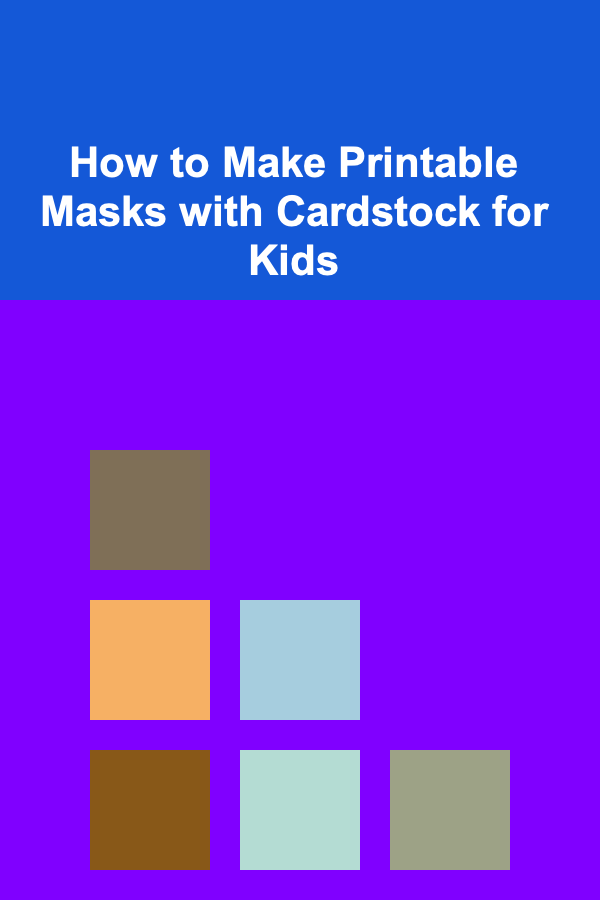
How to Make Printable Masks with Cardstock for Kids
ebook include PDF & Audio bundle (Micro Guide)
$12.99$5.99
Limited Time Offer! Order within the next:

Creating printable masks with cardstock is a fun, easy, and affordable way to engage children in creative activities. Whether for a themed party, school project, or just a rainy day craft, making masks can inspire imaginative play and artistic expression. This guide will walk you through the process of making printable masks with cardstock for kids, from the materials needed to step-by-step instructions, including tips and variations to customize the masks for different occasions.
Materials You'll Need
Before you begin crafting printable masks, make sure you have all the necessary materials. The great thing about printable masks is that they require only a few basic supplies, many of which you likely already have around the house.
Essential Materials:
- Cardstock: Choose a thick, sturdy paper (typically 65 lb or heavier). It will provide durability and a professional finish to your masks.
- Printer: You'll need a standard inkjet or laser printer for printing your mask templates.
- Mask Templates: You can create your own designs, download free printable templates from various craft websites, or buy printable mask patterns online.
- Scissors: A sharp pair of scissors will be essential for cutting out the mask shapes with precision.
- Markers, Crayons, or Paints: These are used for decorating and personalizing the masks.
- Elastic Cord or Ribbon: To secure the mask on the child's face, elastic or ribbon will be needed for the mask straps.
- Glue Stick or Tape: These will help with assembling parts of the mask if needed.
- Hole Punch: This is for creating holes to attach the elastic or ribbon straps.
- Optional Decorations: Feathers, glitter, stickers, and foam shapes for extra flair.
Step-by-Step Guide to Making Printable Masks with Cardstock
Step 1: Download or Create Your Mask Templates
There are plenty of free resources online where you can find printable mask templates. You can also make your own mask designs using a graphic design tool such as Adobe Illustrator or Canva.
- Download Templates: Search for free printable masks that are already designed for children, such as animal faces (lions, tigers, cats), superhero masks (Batman, Spider-Man), or even fantasy creatures (fairies, dragons, pirates).
- Create Your Own: If you have a specific theme in mind, design your own masks using simple shapes and patterns. Keep in mind that the mask should be large enough to fit comfortably over a child's face.
For a more personalized touch, consider allowing kids to choose their favorite designs or characters. This can make the craft more engaging for them.
Step 2: Print the Templates
Once you've chosen your template, print it on cardstock. Make sure to select the correct paper type in your printer settings to accommodate the thickness of the cardstock.
- Check Printer Settings: Ensure that you select a print setting designed for heavier paper to avoid paper jams or poor-quality printing.
- Preview First: Before printing the final design, do a quick preview of the mask on regular paper to check that the size and proportions are correct.
Step 3: Cut Out the Mask Shape
Once your mask design is printed on cardstock, carefully cut it out using scissors.
- Cut Along the Edges: Follow the outline of the mask carefully to ensure clean edges. If the mask has intricate details like eye holes or a mouth, take your time with the cutting.
- Make Eye Holes: Use scissors or a hole punch to create eye holes if your template doesn't include them. The holes should be positioned at the correct spot to match the child's eyes comfortably.
Step 4: Decorate the Mask
This is the most fun part of the process! Give children the freedom to express their creativity by decorating the mask with a variety of materials.
- Markers, Crayons, and Paint: Let kids color in the mask, adding their personal touch to the design. Bright, bold colors work well for masks, especially for animals or superheroes.
- Stickers and Foam Shapes: Decorate the mask with fun embellishments like foam stickers, rhinestones, or glitter. These add texture and make the masks visually exciting.
- Feathers, Sequins, and Beads: If you're making a masquerade-style or animal-themed mask, attach feathers or beads for added flair.
- Personalize with Names: For an extra-special touch, write the child's name on the mask to make it uniquely theirs.
Step 5: Attach the Straps
To turn your mask into something wearable, you'll need to attach straps that will hold it in place on the child's face. There are two main options for this:
- Elastic Cord: Measure a piece of elastic that fits around the back of the child's head comfortably. Cut the elastic to size, and then use a hole punch to create holes on either side of the mask. Thread the elastic through these holes and tie knots to secure it in place.
- Ribbon: If you prefer a more adjustable option, use ribbon to tie the mask. Cut two pieces of ribbon long enough to go around the child's head. Attach the ribbon by punching holes and tying them in place.
Step 6: Final Touches and Adjustments
After attaching the straps, put the mask on the child to check the fit. Adjust the straps as needed to ensure comfort. The mask should sit securely but not too tight on their face.
- Fit Check: Ensure that the mask fits over the child's eyes properly and that the straps are not too tight. If needed, trim the elastic or ribbon for a more comfortable fit.
- Make Sure the Mask is Safe: Make sure that the mask doesn't have any sharp edges or small pieces that could pose a safety risk.
Creative Variations for Mask Designs
While animal masks and superhero masks are popular choices, the possibilities are endless when it comes to designing and customizing printable masks. Here are a few fun and unique mask ideas to consider:
1. Superhero Masks
Superhero masks are a great way to engage children's imaginations. Design masks based on their favorite characters, whether from comic books or movies. You can create simple eye masks or full-face masks, depending on the complexity of the design.
- Design Tips: Focus on iconic superhero logos, like Superman's "S" or Batman's bat silhouette, for added recognition.
2. Animal Masks
Animal masks allow children to become their favorite creatures. Whether it's a tiger, bunny, or lion, animal masks offer great opportunities for colorful designs.
- Design Tips: Use bright colors like orange, yellow, and brown for animal faces. Add fun features like whiskers, manes, or paws for more detail.
3. Pirate and Fairy Masks
For themed parties or imaginative play, pirate and fairy masks are a fun option. You can design pirate hats, eye patches, or full fairy faces with wings.
- Design Tips: Use gold and silver embellishments for pirates, and soft pastel colors like lavender and pink for fairies.
4. Seasonal and Holiday Masks
Celebrate different seasons or holidays with themed masks. Halloween masks can feature pumpkins, ghosts, or bats, while Christmas masks might include reindeer, Santa, or snowflakes.
- Design Tips: Use thematic colors such as orange and black for Halloween, or red, green, and gold for Christmas.
5. Nature Masks
Nature-inspired masks, such as flowers, trees, and leaves, allow children to embrace the outdoors. These masks are perfect for spring or summer crafts.
- Design Tips: Use shades of green for leaves, bright colors for flowers, and earth tones for tree bark.
Benefits of Making Printable Masks
Making printable masks with cardstock is not only a fun activity, but it also offers various developmental benefits for kids. Here are a few reasons why this craft is a great choice:
1. Enhances Creativity
The decorating process allows children to explore their creative abilities. By choosing colors, designs, and embellishments, kids can express themselves through their artwork.
2. Develops Fine Motor Skills
Cutting the mask out and applying decorations helps improve fine motor skills, hand-eye coordination, and attention to detail. These activities are important for a child's development.
3. Encourages Imaginative Play
Once the masks are complete, children can use them for role-playing and imaginative play. This can help develop storytelling skills, creativity, and social interaction.
4. Boosts Problem-Solving Abilities
As kids work on their designs, they may need to think critically about how to attach straps or how to decorate intricate parts of the mask. This fosters problem-solving and decision-making skills.
Conclusion
Making printable masks with cardstock is a versatile and enjoyable activity for kids. Whether you're crafting for a party, holiday, or just to pass the time, the process of creating and decorating masks encourages creativity, imagination, and skill development. By following the simple steps outlined in this guide, you can easily turn a plain sheet of cardstock into a fun and functional mask. So gather your materials, download or design your templates, and start crafting memorable masks with your kids today!
Reading More From Our Other Websites
- [Metal Stamping Tip 101] The Ultimate Guide to Aluminum Metal Stamping: Techniques, Tools, and Best Practices
- [Home Pet Care 101] How to Keep Your Home Clean and Free from Pet Odors
- [Organization Tip 101] How to Create a Seasonal Shoe Rotation Calendar
- [Home Budget Decorating 101] How to Find Budget-Friendly Furniture That Looks Luxe
- [Polymer Clay Modeling Tip 101] Best Techniques for Achieving Metallic Sheen on Polymer Clay Without Real Metal
- [Home Maintenance 101] Best Ways to Prevent Mold Growth and Maintain a Healthy Living Space
- [Horseback Riding Tip 101] Flexibility Boosters: Stretching Sequences for Riders and Their Horses
- [Organization Tip 101] Top 10 DIY Home Improvement Projects to Boost Your Home's Value
- [Home Maintenance 101] How to Organize Your Home Maintenance Tasks for Maximum Efficiency
- [Home Maintenance 101] How to Perform Regular Plumbing Maintenance to Avoid Leaks

Effective Strategies for Customer Success Managers: Driving Retention and Satisfaction
Read More
How to License Your Deep Learning Models for Ongoing Revenue
Read More
How to Soundproof Your Home for Music Practice or Recording Studios
Read More
How to Utilize Rolling Carts for Mobile Essential Oil Storage
Read More
How To Understand the Physical Demands of Extreme Sports
Read More
How to Plan a Destination Wedding on a Budget
Read MoreOther Products

Effective Strategies for Customer Success Managers: Driving Retention and Satisfaction
Read More
How to License Your Deep Learning Models for Ongoing Revenue
Read More
How to Soundproof Your Home for Music Practice or Recording Studios
Read More
How to Utilize Rolling Carts for Mobile Essential Oil Storage
Read More
How To Understand the Physical Demands of Extreme Sports
Read More